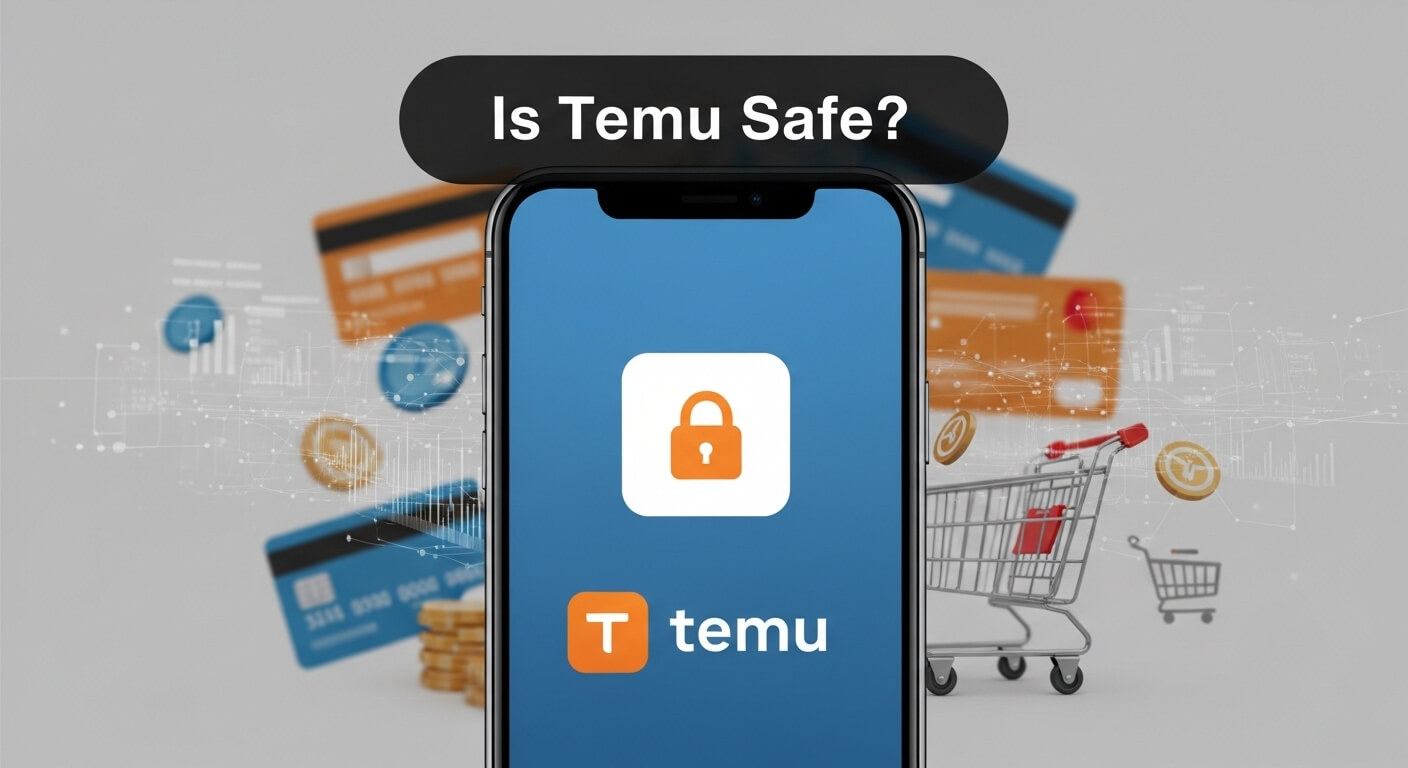Introduction to Temu: What It Is and Why Safety Matters in 2025
Temu, launched in 2022 by PDD Holdings, has become a global e-commerce sensation, boasting over 500 million downloads by 2025. Offering ultra-low prices on clothing, electronics, home goods, and more, it competes with giants like Amazon, AliExpress, and Shein. Its gamified shopping, flash sales, and “shop like a billionaire” slogan attract budget-conscious consumers. However, its meteoric rise raises a critical question: Is Temu safe?
Safety on Temu spans data privacy, product quality, scam risks, ethical sourcing, and overall legitimacy. In 2025, with regulatory scrutiny, lawsuits, and cybersecurity concerns, users must balance bargains against potential risks. While millions of orders are processed daily without widespread fraud, issues like malware allegations, forced labor concerns, and data breaches fuel debate. This guide analyzes Temu’s safety through recent investigations, user experiences, and expert insights to help you shop confidently.
Temu’s direct-from-manufacturer model cuts costs but introduces vulnerabilities. PDD Holdings reported over $30 billion in 2024 revenue, yet Temu’s F rating from the Better Business Bureau (BBB) due to unresolved complaints raises flags. We’ll explore privacy policies, security measures, product authenticity, ethical issues, and practical tips to ensure safe shopping in 2025.
Temu’s Company Background and Legitimacy
Temu operates under WhaleCo Inc. in the US, a subsidiary of PDD Holdings, a Nasdaq-listed company (PDD) founded in 2015. This public status subjects it to SEC oversight, lending credibility. Temu is not a scam—it delivers products, uses secure payment processors like PayPal and Stripe, and offers buyer protections, including 90-day returns and a purchase protection program. However, its lack of BBB accreditation and a 2.3/5 Trustpilot rating highlight concerns over customer service and product issues.
In 2025, Temu faces lawsuits from states like Kentucky and Nebraska, alleging deceptive practices, data theft, and intellectual property violations. Kentucky claims Temu installs malware to share data with the Chinese government, while Nebraska cites consumer protection issues. Temu denies these, emphasizing compliance with US laws and partnerships with Oracle for data storage, similar to TikTok’s approach.
Experts, including cybersecurity firms, confirm Temu’s legitimacy for transactions but warn about inconsistent quality and ethical concerns. It’s not a pyramid scheme or fake site; users receive items, though shipping from China (7-15 days) and variable quality are common complaints. Temu connects buyers to third-party sellers, reducing costs but increasing scam risks from unverified vendors. Overall, Temu is a legitimate marketplace, but safety requires caution.
Data Privacy and App Security Concerns on Temu
Data privacy is a major concern for Temu users in 2025. The app collects extensive data—location, contacts, payment details—per its June 2025 privacy policy. A 2023 report, still relevant, claimed Temu’s code bypasses phone privacy settings, acting as potential spyware. A 2025 Swiss security analysis found no critical vulnerabilities but noted unusual code loading and extra encryption, raising suspicions.
Lawsuits amplify fears. Kentucky alleges Temu shares data with China, violating privacy laws. A rumored 2025 data breach involving 87 million records was debunked, but concerns persist due to Chinese ownership and laws mandating government data access. National security experts compare Temu to TikTok, highlighting risks.
Positively, Temu uses HTTPS encryption and doesn’t store full credit card details. Independent audits in 2025 found no malware, though excessive permissions (e.g., camera, microphone) seem unnecessary for shopping. Users report no widespread hacks, but privacy advocates recommend guest checkouts and VPNs. With GDPR and CCPA enforcement, Temu has improved transparency, but its Chinese ties keep concerns alive.
Product Quality, Counterfeits, and Scam Risks
Temu’s low prices come from direct sourcing, but quality varies. User reviews describe products as “hit or miss”—some durable, others flimsy or counterfeit. A 2025 analysis noted frequent complaints about inaccurate descriptions, with items arriving smaller or lower quality than advertised. Counterfeits, like fake car seats failing US safety standards, were reported in March 2025. Scams include phishing via fake recruiter texts and undelivered orders.
The BBB logs thousands of complaints about poor quality and refund issues. However, positive reviews exist; some users praise durable kitchen tools lasting years. Temu’s return policy covers defects, but shipping returns to China is costly. To avoid scams, check seller ratings, read photo reviews, and use secure payment methods. Vigilance is key to navigating Temu’s marketplace.
Ethical Concerns: Forced Labor and Sustainability
Temu’s supply chain ethics face scrutiny. A 2023 US congressional report flagged a high risk of forced labor from Xinjiang, violating the Uyghur Forced Labor Prevention Act. In 2025, lawmakers question Temu’s transparency, with the company denying involvement but lacking robust audits. A 2024 Ethical Fashion Report gave Temu low scores for labor practices. Sustainability concerns include overproduction and waste from cheap, disposable goods. The current US administration considers adding Temu to forced labor lists. While Temu claims supplier codes of conduct, enforcement is weak. Ethical shoppers may prefer platforms with verified supply chains.
User Reviews and Real Experiences in 2025
User reviews offer a mixed picture. Trustpilot’s 2.3/5 rating reflects praise for affordability but criticism for quality and service. Social media communities report safe shopping and smooth returns. A 2025 review noted Temu’s legitimacy but advised caution. Common praises include low prices and variety; complaints focus on delays, defects, and customer service. Social media posts highlight occasional scams but confirm most orders arrive. Satisfaction averages around 60%, with better experiences for low-risk items like household goods.
How to Shop Safely on Temu in 2025
To minimize risks, follow these steps:
- Use Secure Payments: Opt for PayPal or virtual cards to protect financial data.
- Read Reviews: Check seller ratings and photo reviews for accuracy.
- Avoid Storing Card Info: Use guest checkout to limit data exposure.
- Enable Two-Factor Authentication: Add security to your account.
- Use a VPN: Protect your connection, especially on public Wi-Fi.
- Report Issues Promptly: Contact Temu support for refunds or disputes.
Temu’s buyer protections cover most issues, but proactive steps enhance safety.
Alternatives to Temu for Safer Shopping
For safer options, consider:
- AliExpress: Better quality controls, though similar sourcing.
- Amazon: Robust buyer protections with Prime.
- Walmart: US-based with reliable returns.
- Etsy or Fair Trade Sites: Ethical sourcing for conscious shoppers.
Each offers trade-offs in price and selection but may reduce risks.
Frequently Asked Questions: High-Volume Queries Answered
- Is Temu legit?
Yes, Temu is a legitimate marketplace owned by PDD Holdings, delivering products globally. However, its F BBB rating reflects customer service issues. - Is Temu a scam?
Temu itself isn’t a scam, but third-party sellers may engage in deceptive practices like phishing or fake products. - Is Temu safe for credit cards?
Safe with encrypted payments; use PayPal or virtual cards for added security. - Does Temu use forced labor?
Reports suggest a high risk, though Temu denies it and claims compliance. - What are common Temu complaints?
Poor quality, shipping delays, counterfeits, and slow customer service. - Is Temu spyware?
No confirmed malware in 2025 audits, but excessive permissions raise concerns. - How to avoid Temu scams?
Verify sellers, read reviews, and report suspicious activity promptly. - Are Temu products good quality?
Quality varies; some items are durable, but many are low-end or counterfeit. - Does Temu sell your data?
Its policy allows sharing with affiliates; lawsuits allege government access. - Is Temu better than Shein?
Both face similar ethical and quality issues, but Temu is often cheaper.
Conclusion: Weighing the Risks and Rewards of Temu in 2025
Temu offers unmatched affordability but carries risks in privacy, quality, and ethics. Its legitimacy is backed by secure payments and buyer protections, yet lawsuits and ethical concerns warrant caution. Shop smartly with secure methods and thorough checks, or explore alternatives for greater peace of mind.
Editor of The Best Update, with over 10 years of writing experience, delivering insightful, well-researched, and engaging content across diverse topics to keep readers informed and inspired.




